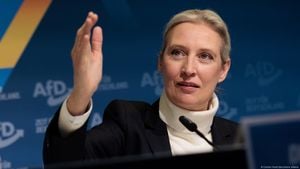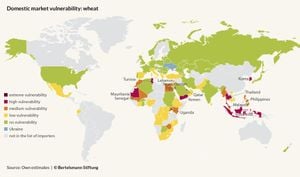Switzerland has signaled its possible readiness to contribute troops to a future peacekeeping mission in Ukraine, marking a noteworthy step for the traditionally neutral nation. This declaration came from the Commander of the Swiss Armed Forces, Thomas Zussli, during an interview with SonntagsBlick.
Zussli highlighted Switzerland’s ability to potentially deploy around 200 soldiers within a timeframe of nine to twelve months, contingent upon receiving the appropriate request from the United Nations and subsequent approval from the Swiss government. He stated, "We probably can deploy about 200 soldiers within nine to twelve months." This observation points to Switzerland’s willingness to engage diplomatically with international peacekeeping frameworks, though he elaborated the necessity of proper conditions, saying, "All discussions about sending peacekeepers remain hypothetical, as it is unclear how the war will continue. The establishment of peace is still not evident, nor have there been any requests from the UN."
The notion of sending Swiss troops stems from the broader European discussion on deploying peacekeeping forces to Ukraine, especially following the extensive and brutal conflict following Russia's full-scale invasion of Ukraine. Other European leaders, including those from the UK and France, have also expressed interest in formulating substantial, combined peacekeeping contingents contingent on eventual peace agreements. This highlighted international commitment raises questions about the future roles for nations steeped in neutrality, like Switzerland, which has maintained its non-aligned status since the early 19th century.
Switzerland's historical commitment to neutrality was first established with the proclamation of its permanent neutrality at the Congress of Vienna in 1815—a status it has remarkably preserved without participating in any wars or military alliances since then. Despite this longstanding position, Zussli clarified the nuances surrounding Switzerland’s potential participation in peacekeeping efforts: "We must differentiate between peace enforcement missions and peacekeeping missions. Switzerland does not participate where force is required. Whether we participate will depend on peace being established first."
These discussions surrounding the deployment of peacekeepers also invoke the structural challenges related to Switzerland’s military capabilities and legislative processes. Discussions of military engagement, even for peacekeeping, must receive extensive vetting through Switzerland’s parliamentary procedures to maintain alignment with its neutrality policy. Zussli explained how this operational readiness is not just about troop numbers but also requires thorough planning and preparation for deployment, which includes training and equipping personnel. He said, "If we are entrusted with participating in the mission, we would develop training concepts for our soldiers."
The larger geopolitical environment is also accusing, as Zussli touched on growing concerns related to Russia's military posture and potential destabilization efforts across Europe. He referred to alarming predictions from European intelligence agencies, stating, "If we listen to European politicians and intelligence services, we should assume Russia will be ready for another wave of destabilization and conflict escalation by 2027." This underline the urgency and imperative nature of international cooperative security solutions involving nations like Switzerland.
For now, conversations about the specifics of how Switzerland might arrange for the training and deployment of its soldiers—including operational logistics—remain speculative. The prospect does, nevertheless, reflect Switzerland's continuing evolution within the international security arena. After all, as Zussli notes, "Currently, Swiss soldiers are dispatched to Kosovo or Bosnia for six months; similarly, this could work for Ukraine if the political will exists."
Though there are hurdles to overcome, including the consequential decisions within the Swiss parliament, and the need for solidified agreements through the UN to proceed with any peacekeeping roles, it marks a shift for Switzerland. Its engagement hinges on achieving the necessary conditions to uphold its neutral status even as it navigates international calls for assistance—in this case, addressing conflicts with the specter of Russian aggression looming large over Europe.



